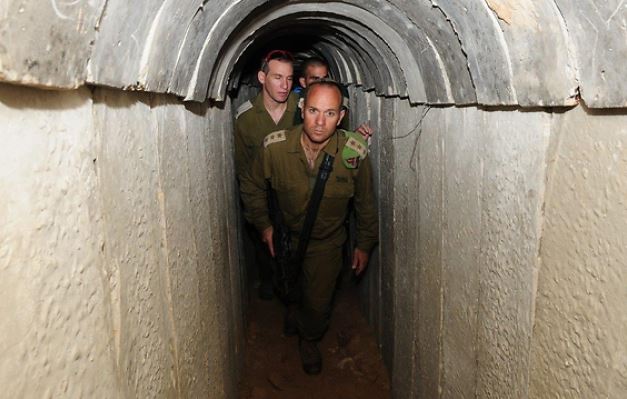
Following persistent pressure from citizens living near the Gaza Strip, the Israel forces have decided to accelerate the Obstacle defense system to block Hamas tunnels and other threats from Gaza, Israeli media reported.
Two years after the 2014 war that was carried out in the Gaza Strip, Israeli security forces have decided to step up plans to develop a new defense system called the Obstacle, which aims to address the threat of underground tunnels dug by Hamas forces coming from Gaza into Israel.
The project itself is comprised of several lines of defense: technology used to combat underground threats such as Hamas-dug tunnels, erecting a “smart,” high-tech fence along the Gaza border and a system set to improve Israel’s responsiveness to rocket and mortar firing. All in all, the Obstacle is supposed to cost 2.2 billion NIS, according to Israeli media.
The Obstacle had been shelved for some time due to budgetary concerns, but following mounting pressure from residents living in settlements along the Gaza Strip, Finance Minister Moshe Kahlon announced several months ago that “The budget will not be an impediment in fast tracking this project.”
On the other hand, Israeli Education Minister Naftali Bennett advocated on Thursday for Israel to kidnap Palestinian to be used as leverage to obtain the release of two Israeli civilians and the bodies of two soldiers held in the besieged Gaza Strip.
He discussed the issue of releasing Palestinian prisoners as part of a deal to obtain the return of Israeli citizens Avraham Mengistu and Hisham al-Sayed, as well as the bodies of Hadar Goldin and Oron Shaul, two soldiers killed during Israel’s 2014 offensive on Gaza.
According to Israeli news outlet The Jerusalem Post, Bennett then advocated for the kidnapping of Palestinians to pressure for the release of the slain soldiers and missing Israelis.
“We should do what the State of Israel once did,” he said. “What we once did in such situations was we would go and kidnap from the other side, and create new leverage against the other side, rather than releasing more and more terrorists.”
The Jerusalem Post quoted Bennett’s spokesperson as specifying that the far-right political leader was suggesting kidnapping “terrorists,” not Palestinian civilians.
It remained unclear from Bennett’s statement whether he advocated the kidnapping of Palestinians to use as a bargaining chip to exchange with Israelis, in contradiction of his earlier statement, or as an intimidation tactic to coerce those holding the Israelis in Gaza into releasing them.
It was also unclear whether Bennett was pushing for Israel should detain more Palestinians in addition to the 7,000 currently held in Israeli prisons, or hold them completely extrajudicially.
In the wake of several attacks last week which killed two Israelis, including a 13-year-old girl, and three Palestinians, Bennett advocated for a number of measures which have been denounced by rights groups as constituting collective punishment.
These proposed measures, many of which have been implemented, included increased settlement construction; stepping up Israel’s policy of demolition of Palestinian property built without permits; full Israeli military control over the entirety of the occupied West Bank; military closures of suspected attackers’ hometowns; the detention of suspected attackers’ family members; and cutting off internet and cellular access to the southern West Bank district of Hebron.
Israel is still withholding the bodies of at least seven Palestinians killed by Israeli forces since October, as the slain Palestinians’ families remain uncertain as to when, and if, they will be released for burial.



